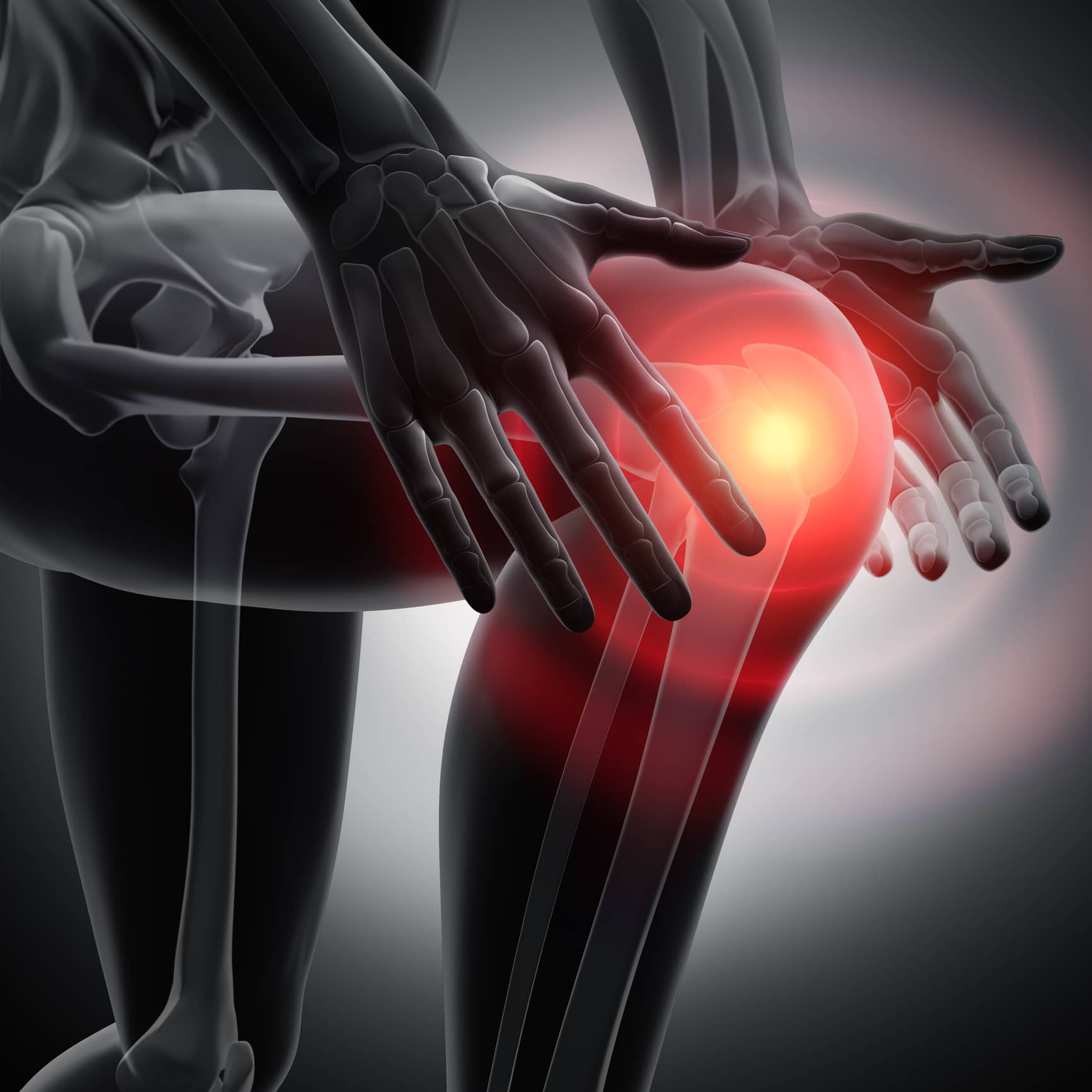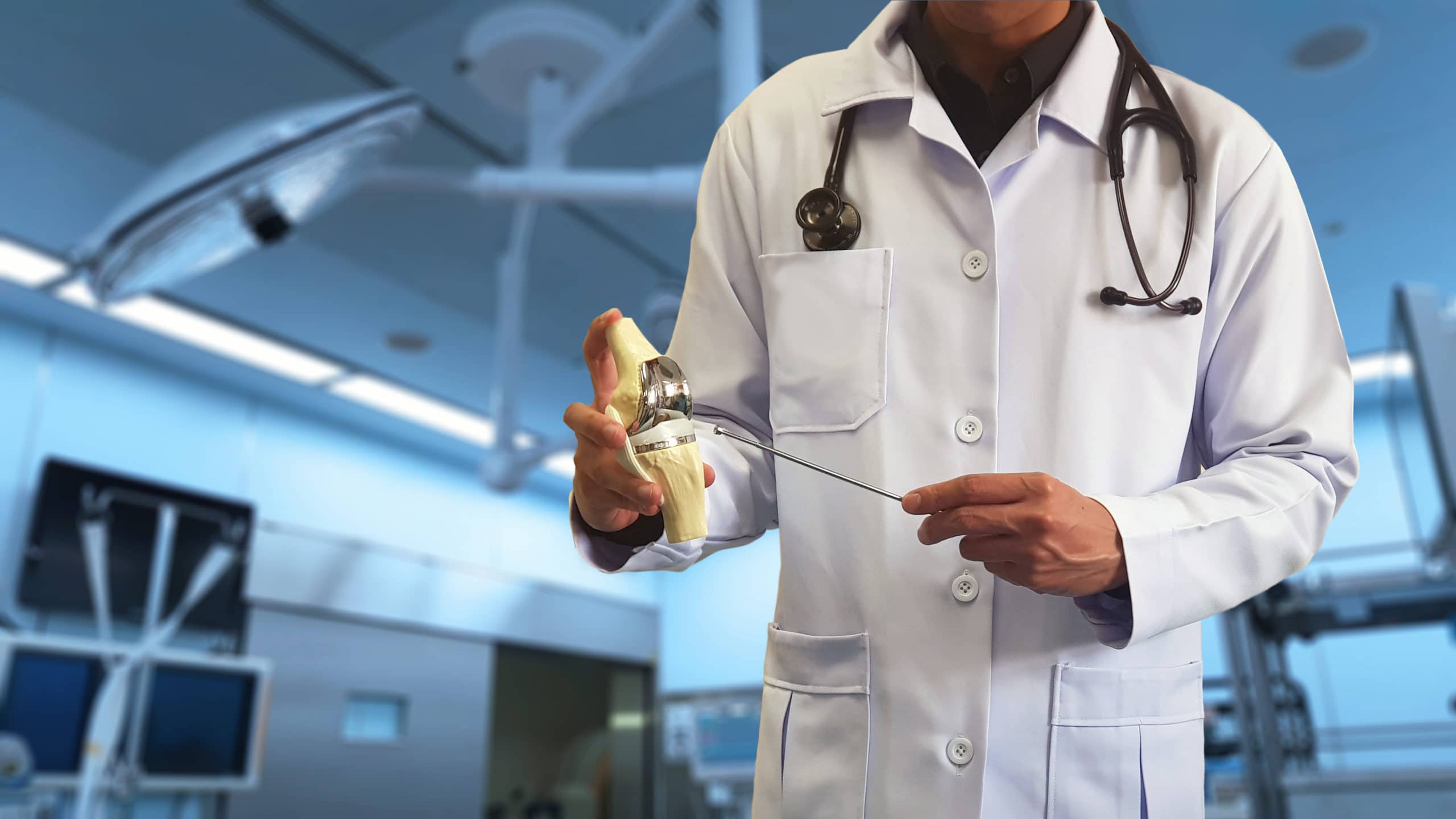What is a Total Knee Replacement?
Knee replacement surgery is the procedure performed to repair severe damage to the knee joint. This surgery may be considered when more conservative therapies are no longer helping to reduce pain and improve physical mobility. A total knee replacement removes damaged joint structures, including bone and cartilage, and replaces them with plastic and metal fixtures that stabilize the joint space and eliminate pain.

What Causes Knee Pain?
Chronic knee pain is often caused by arthritis. There are various types of arthritis, but three types have been associated with potentially debilitating knee pain. These include:
Osteoarthritis
This condition is related to the wear and tear on the joints over time. Related to age, osteoarthritis is typically diagnosed in adults over the age of 50 but can occur at a younger age. Pain occurs when the cartilage that pads the knee joint degrades. This results in pain and stiffness in the knee.
Post-traumatic Arthritis
This type of arthritis is a byproduct of an injury to the knee joint. Injury may have initially damaged a ligament or tendon or may have fractured a bone. These types of injuries can lead to damage to the articular cartilage, resulting in a limited range of motion and pain.
Rheumatoid Arthritis
This form of arthritis is inflammatory and related to the immune system. It is a chronic disease that causes the body’s immune system to attack and degrade the joint surfaces. Chronic inflammation results in pain, swelling, and damage to the cartilage.
What Conditions May Cause the Need for a Total Knee Replacement?
Osteoarthritis is the most common condition that leads to a need for total knee replacement. However, any form of arthritis can eventually result in the need for joint replacement.
What Are the Signs of Needing a Knee Replacement?
If you are experiencing knee pain and stiffness that inhibits your daily activities, see an orthopedic specialist. Signs that knee replacement surgery may be needed include:
- Limitations in daily activities such as climbing stairs, walking and getting in and out of chairs indicating that the knee joint may need repair.
- Moderate to severe knee pain when at rest. Knee pain that wakes you up at night.
- Deformity of the leg, such as bowing of the knee.
- Chronic pain and swelling that does not improve with medication and rest.
- Conservative remedies like medication, rest, injections, and physical therapy are not improving comfort and range of motion.
How Successful is a Knee Replacement?
Studies suggest that more than 90% of knee replacement procedures are successful in the goal of reducing pain and improving mobility and quality of life.
How Long Will a Knee Replacement Last?
The new knee joint can last many years. Although every case is different, it is not unusual for artificial joints to last more than 25 years.
Will I Ever Need a Second Knee Replacement?
If a joint breaks down or fails over time, it can be revised (or replaced with a new implant), although the majority of joint replacements performed are never revised. Normal daily activities will gradually degrade the joint. This process may be accelerated by excessive weight or the routine performance of high-impact activities. After a knee replacement, many doctors advise against jumping activities, running, and high-impact sports. Those who undergo knee replacement can expect to comfortably walk, swim, golf, dance, bike, hike, and enjoy low-impact sports. Many joint replacement patients maintain a very high level of activity.
How is a Total Knee Replacement Performed?
Knee replacement surgery is generally performed in a hospital operating room or an ambulatory surgery facility. During the procedure, diseased bone and cartilage are removed from the knee joint (where the femur and tibia meet). The surfaces that have been removed are replaced with a metal implant.

A special plastic implant is normally placed at the backside of the kneecap and also in between the two metal parts of the artificial knee joint. The metal and plastic restore the smooth surface of the knee joint to support flexion and comfortable bending. Due to advances in joint replacement surgery, an increasing number of joint replacement procedures are now being done ambulatory, allowing patients to return home on the day of surgery.
Patient Testimonial
“Having my knee surgery done by Dr. Petraco was one of the best decisions I’ve ever made. I am only 2 weeks post-surgery and very surprised at how well I am doing.”
Click here to read more reviews.
How Long is Recovery After Knee Replacement Surgery?
Patients who have their knee replaced in the hospital typically stay over one night or two. Recovery and rehabilitation are critical aspects of returning to an active lifestyle, so physical therapy usually begins the day following surgery. At discharge, patients are able to stand on their own with no assistance. They are able to use the bathroom, bathe, and dress and go on slightly longer walks. Patients also are able to climb and descend stairs by the time they are released from the hospital. With consistent work, many normal activities can resume in the 12 weeks after knee replacement.
What is the Importance of Physical Therapy After Knee Replacement?
Rehabilitation is one of the most important aspects of total knee replacement. Proper care is essential to restoring optimal comfort and range of motion. The purpose of physical therapy after total knee replacement is to regain strength and movement. Initially, patients may need a walker but most progress quickly to a cane and are able to abandon all assistive devices within a few short weeks.
Schedule Your Consultation Today!
If you're interested in learning more about knee replacement please contact us for a consultation at 631.689.6698 or fill out our contact us form below. We will discuss your needs and concerns, and determine your best course of action.


